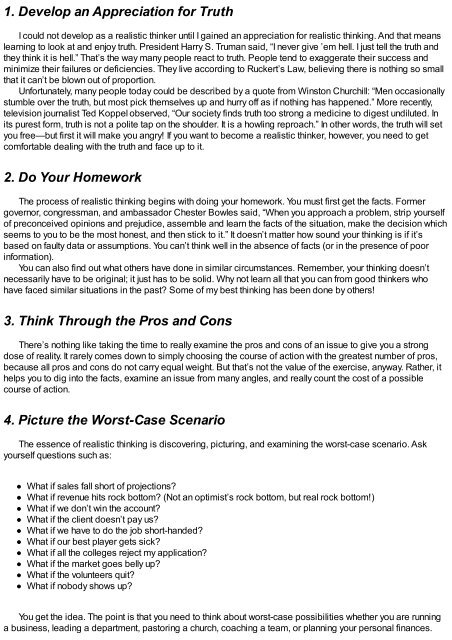howsuccessfulpeoplethink-changeyourthinkingchangeyourlife-150414064712-conversion-gate01-ID-3023c225-7df9-4268-9ab4-d2b9cb3d4c62
Create successful ePaper yourself
Turn your PDF publications into a flip-book with our unique Google optimized e-Paper software.
1. Develop an Appreciation for Truth<br />
I could not develop as a realistic thinker until I gained an appreciation for realistic thinking. And that means<br />
learning to look at and enjoy truth. President Harry S. Truman said, “I never give ’em hell. I just tell the truth and<br />
they think it is hell.” That’s the way many people react to truth. People tend to exaggerate their success and<br />
minimize their failures or deficiencies. They live according to Ruckert’s Law, believing there is nothing so small<br />
that it can’t be blown out of proportion.<br />
Unfortunately, many people today could be described by a quote from Winston Churchill: “Men occasionally<br />
stumble over the truth, but most pick themselves up and hurry off as if nothing has happened.” More recently,<br />
television journalist Ted Koppel observed, “Our society finds truth too strong a medicine to digest undiluted. In<br />
its purest form, truth is not a polite tap on the shoulder. It is a howling reproach.” In other words, the truth will set<br />
you free—but first it will make you angry! If you want to become a realistic thinker, however, you need to get<br />
comfortable dealing with the truth and face up to it.<br />
2. Do Your Homework<br />
The process of realistic thinking begins with doing your homework. You must first get the facts. Former<br />
governor, congressman, and ambassador Chester Bowles said, “When you approach a problem, strip yourself<br />
of preconceived opinions and prejudice, assemble and learn the facts of the situation, make the decision which<br />
seems to you to be the most honest, and then stick to it.” It doesn’t matter how sound your thinking is if it’s<br />
based on faulty data or assumptions. You can’t think well in the absence of facts (or in the presence of poor<br />
information).<br />
You can also find out what others have done in similar circumstances. Remember, your thinking doesn’t<br />
necessarily have to be original; it just has to be solid. Why not learn all that you can from good thinkers who<br />
have faced similar situations in the past? Some of my best thinking has been done by others!<br />
3. Think Through the Pros and Cons<br />
There’s nothing like taking the time to really examine the pros and cons of an issue to give you a strong<br />
dose of reality. It rarely comes down to simply choosing the course of action with the greatest number of pros,<br />
because all pros and cons do not carry equal weight. But that’s not the value of the exercise, anyway. Rather, it<br />
helps you to dig into the facts, examine an issue from many angles, and really count the cost of a possible<br />
course of action.<br />
4. Picture the Worst-Case Scenario<br />
The essence of realistic thinking is discovering, picturing, and examining the worst-case scenario. Ask<br />
yourself questions such as:<br />
What if sales fall short of projections?<br />
What if revenue hits rock bottom? (Not an optimist’s rock bottom, but real rock bottom!)<br />
What if we don’t win the account?<br />
What if the client doesn’t pay us?<br />
What if we have to do the job short-handed?<br />
What if our best player gets sick?<br />
What if all the colleges reject my application?<br />
What if the market goes belly up?<br />
What if the volunteers quit?<br />
What if nobody shows up?<br />
You get the idea. The point is that you need to think about worst-case possibilities whether you are running<br />
a business, leading a department, pastoring a church, coaching a team, or planning your personal finances.

















